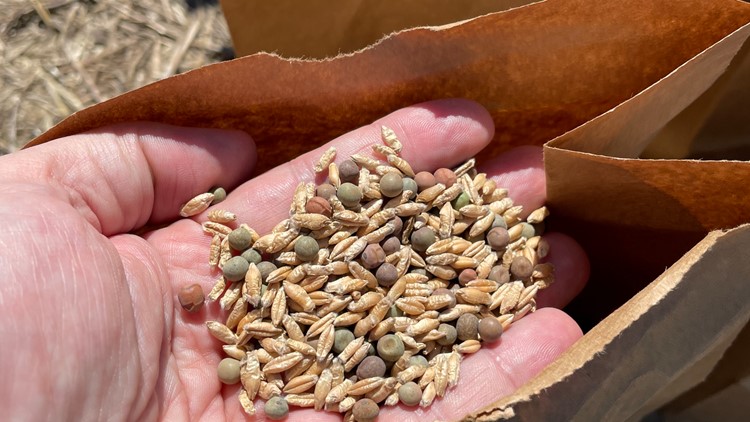MEMPHIS, Tenn. — Two University of Memphis professors are planting seeds to answer questions on why and how to reduce greenhouse gas emissions in agriculture, thanks to a new grant provided by the Energy Department.
Agriculture is a major contributor of greenhouse gas emissions, and one known solution for this is to plant cover crops, but what’s not well known is why this happens. To answer this, Dr. Shawn Brown and Dr. Jennifer Mandel from the UofM are joining forces to find out why.
“(The greenhouse gas emissions from agriculture) doesn't get a whole lot of research into it, and how we might mitigate it, the larger part of this work is to try to see if changes in how we farm might help reduce the output of (it) in the atmosphere,” said Brown, who works as associate professor in biological sciences at the University of Memphis.
Greenhouse emissions are a major contributor to global warming. Although in the U.S., the main source of greenhouse gas emissions comes from burning fossil fuels, the United States Environmental Protection Agency (EPA) says agriculture is responsible for 10 to 11% of all greenhouse gas emissions in the economic sector, this includes both planting crops and raising cattle.
But while much of the green movement focuses on farming and the greenhouse gas emissions produced by cattle, less is known about the role of agriculture.
The solution to reduce greenhouse gasses from cattle seems simple for some: consuming less red meat, or some opt to go completely vegan. But with farming it’s not that simple.
“We still need farms, we still need food, we still need to eat,” said Brown.
And so the next step is to figure out how to feed a population, while reducing the gas emissions that come with planting the crops.
This is not a new idea, according to Brown there's been an extensive movement for the last 10 to 15 years to change how farming is done to reduce greenhouse emissions. One of the mechanisms to reduce that is by planting “cover crops.”
Cover crops are not crops that you would usually harvest, like corn or cotton, but instead farmers would add different types of grass or clover in between seasons.
The problem is, while it is understood that this method reduces the gas emissions, we don’t why.
“We do this, but we don't really understand how this is actually involved in improving soil health and how this might be involved in reducing greenhouse gas,” said Brown. “This work (tries) to understand how cover crops are playing a role in this and how we might be able to change some strategies where we don't sacrifice yield, so we're not taking money out of farmers mouth or farmers budget, so we can still grow the same amount of soybean, the same amount of cotton, the same amount of corn.”
Another big problem, none of the existing research or knowledge focuses on the Mid-South.
While there is work being done around the world and even across the country, there is a gap around the Memphis region.
“What works in let's say, Nashville, or what works in California, might not work for the unique soils here in the Mid-South,” said Brown.
Because the Mid-South has been neglected in this department, Brown and Mandel are hoping their research can help fill the gap.
This work, Brown says, will also help support farms and protect the soils, adding that this could also help them produce more, which in extension helps the entire region.
“If we are able to support our farmers to produce more, that's more money that can go in,” said Brown. “There's certainly a potential economic benefit to this region. We can actually improve yield.”
Despite its benefits, this entire research started because of curiosity.
According to Mandel, the project started because they are curious about learning. Mandel and Brown had a question and the time to answer them, so they started working on it as a side project.
“It's actually how a lot of cool research gets started, you're just curious about something you're like, ‘Well, let me just ask this question and see what happens,’” said Mandel, who also works as associate professor in the biological sciences department at the University of Memphis. “(That’s why) being a researcher at a university is really nice, because you can kind of pursue where the science takes you.”
While working on this project on the side Brown wrote a grant proposal to the Department of Energy. The result was a $20,000 award from the joint Department of Energy EMSL-JGI program MONet (Molecular Observation Network) for their titled proposal “Impacts of cover cropping on soil health in an Urban farm in the Mid-South.”
For Mandel and Brown, this project continues to grow.
“The project that we have is really like a pilot study to build out and be able to ask more questions,” said Mandel who will working in a new university project alongside Brown that focuses on conservation and sustainable agriculture and food systems.
But for now, Mandel and Brown are using their time and the grants given to find answers to an issue that for so long hasn't been answered in the Mid-South.



